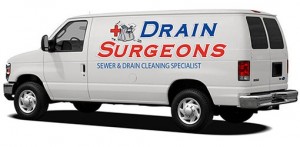There are many parallels between human body surgeons and household plumbers, similar to the parallels between dentists and mechanics. In fact, in the State of Michigan, dentists are officially classified as mechanics. And rightly so, for example, orthodontists study quite a bit of mechanics, dynamics, and materials science.
Surgeons do quite a bit of plumbing; they unclog arteries off of plaque build-up using chemicals and organic substance, similar to plumbers unclogging pipes with detergents and enzymes. Surgeons can stitch torn arteries today instead of amputating body parts, and plumbers do the same using soldering of pipes to keep existing parts. Surgeons can remove tumors resulting from rotting body parts, and so do plumbers with rusting and rotting plumbing components. Once sucks infected blood out, the other rusted stagnant water out. And so on.
The truth is that plumbing is deterministic and near science today, whereas surgery remains as an “art” or pseudo-science, and is less deterministic (relies on skill, trial-and-error, rules, best practices, etc.) It is very unlikely to find a plumber causing sudden death to the system he or she is trying to fix, whereas in surgery, given the uncertainty, complexity of structures, and “non-linearity” of materials response (visco-elasticity), it is seen as more likely. But people continue to pay surgeons higher fees for a job seen much less than perfect. What gives?
The morale of the story is that being more advanced and more deterministic does not pay off (e.g. engineers are paid peanuts today relative to their contribution.) It is better to be in a field where you can use external attribution to explain failure of materials and processes. This is why doctors and lawyers make the big bucks, they operate in a field full of uncertainty and inefficiency. This requires some major skills and training to deal with the unexpected. Things get worse when a surgeon does not anticipate the impact of the action he or she is taking on the body as a whole; i.e. ignoring system-level interactions. A procedure may be successful locally but it may cause problems elsewhere in the body (unexpected endocrine system response, kidney failure, high BP, etc.) Sometimes it is too late to rescue the system.
Doctors may have put themselves in a sandbox and they do not want to get out of it. A multi-disciplinary approach is needed where the experience of engineers, plumbers, system analysts, material scientists, electronic specialists, nano-technologists, etc. is pulled together to make medicine a more deterministic and integrated science. I wish I would live to see the day when every human is wearing an on-board diagnostics (OBD) device showing that all systems are running normal, or not? Automotive Engineers did it, look at your car. Doctors just need to raise the bar, and make it happen. Then, and only then will we pay them less 😉
